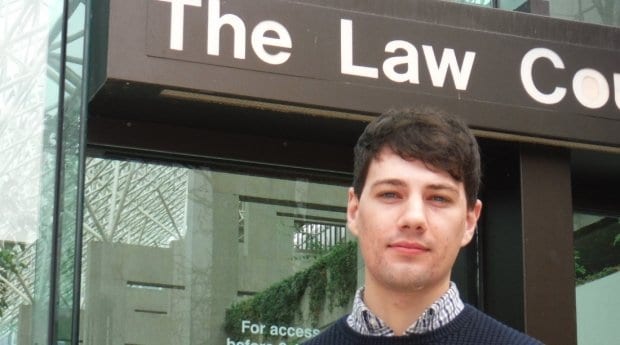Though his case has now been declared moot, a gay would-be law student says the court challenges facing a Christian university’s bid to open a law school that he alleges is discriminatory are far from over.
“The issue of TWU [Trinity Western University] will be decided in the court,” Trevor Loke says. “It is a question of when and which cases will be heard.”
BC Supreme Court Justice Christopher Hinkson ruled March 18 that Loke’s lawsuit against the BC government for approving the proposed law school became moot when the government rescinded its approval for the school last December.
“We expected that the judge may arrive at this decision,” Loke tells Daily Xtra. “We’re pleased that the judge agreed that this case is in the public interest, and we will explore options to see how we can support the law societies in Ontario, Nova Scotia, and BC in their respective cases.”
Loke’s lawyers had argued that in initially approving TWU’s proposed law school, the government condoned its allegedly discriminatory admissions policy — a question, they said, that still needed to be settled in court.
They also argued that since the minister had left the door open for the school to re-apply, the possibility for discrimination continued to exist.
Hinkson didn’t see it that way.
He said the minister’s withdrawal of his consent for the proposed law school “clearly leaves a factual void within which to consider the basis upon which consent might or might not be granted in the future.”
However, Hinkson added, “as the minister has left open the possibility of revisiting his decision in future, Mr Loke’s challenge has not necessarily concluded.”
Hinkson also found Loke’s case was in the public interest and awarded him costs.
For admission to TWU, students must follow a community covenant that they will abstain from intimacy outside heterosexual marriage.
Loke, 25, asserted in his case that then-minister Amrik Virk’s December 2013 approval discriminated against people based on sexual orientation and religious grounds.
The Law Society of BC had argued it should be added as a party to the petition.
Hinkson disagreed.
“The LSBC contends that it has a direct interest in this proceeding because the result will have ‘a direct effect on the Law Society’s exercise of its statutory powers and ability to fulfill its statutory mandate,’” Hinkson said. “I do not accept that such an interest is a direct one.”
With the Loke case now out of the way, the court must deal with the lawsuit TWU brought against the BC law society for reversing its earlier decision to approve the school.
TWU alleges the law society has no authority under the provincial Legal Profession Act to refuse graduates who meet the act’s primary objective, which is assuring the competence of lawyers in the public interest.
Law society spokesperson Ryan Lee says he can’t comment on the case since it’s still before the courts.

 Why you can trust Xtra
Why you can trust Xtra


